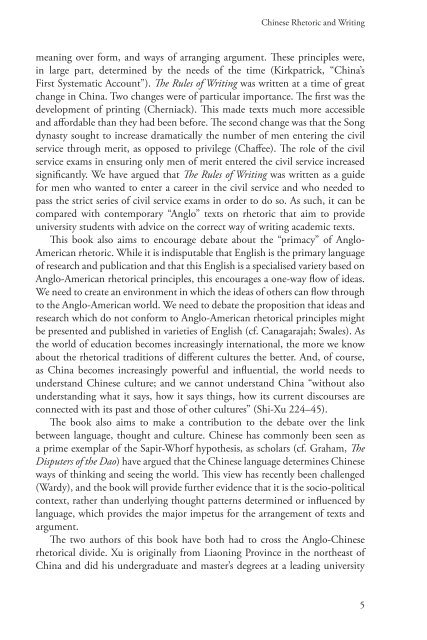Chinese Rhetoric and Writing - An Introduction for Language Teachers, 2012a
Chinese Rhetoric and Writing - An Introduction for Language Teachers, 2012a
Chinese Rhetoric and Writing - An Introduction for Language Teachers, 2012a
Create successful ePaper yourself
Turn your PDF publications into a flip-book with our unique Google optimized e-Paper software.
<strong>Chinese</strong> <strong>Rhetoric</strong> <strong>and</strong> <strong>Writing</strong><br />
meaning over <strong>for</strong>m, <strong>and</strong> ways of arranging argument. These principles were,<br />
in large part, determined by the needs of the time (Kirkpatrick, “China’s<br />
First Systematic Account”). The Rules of <strong>Writing</strong> was written at a time of great<br />
change in China. Two changes were of particular importance. The first was the<br />
development of printing (Cherniack). This made texts much more accessible<br />
<strong>and</strong> af<strong>for</strong>dable than they had been be<strong>for</strong>e. The second change was that the Song<br />
dynasty sought to increase dramatically the number of men entering the civil<br />
service through merit, as opposed to privilege (Chaffee). The role of the civil<br />
service exams in ensuring only men of merit entered the civil service increased<br />
significantly. We have argued that The Rules of <strong>Writing</strong> was written as a guide<br />
<strong>for</strong> men who wanted to enter a career in the civil service <strong>and</strong> who needed to<br />
pass the strict series of civil service exams in order to do so. As such, it can be<br />
compared with contemporary “<strong>An</strong>glo” texts on rhetoric that aim to provide<br />
university students with advice on the correct way of writing academic texts.<br />
This book also aims to encourage debate about the “primacy” of <strong>An</strong>glo-<br />
American rhetoric. While it is indisputable that English is the primary language<br />
of research <strong>and</strong> publication <strong>and</strong> that this English is a specialised variety based on<br />
<strong>An</strong>glo-American rhetorical principles, this encourages a one-way flow of ideas.<br />
We need to create an environment in which the ideas of others can flow through<br />
to the <strong>An</strong>glo-American world. We need to debate the proposition that ideas <strong>and</strong><br />
research which do not con<strong>for</strong>m to <strong>An</strong>glo-American rhetorical principles might<br />
be presented <strong>and</strong> published in varieties of English (cf. Canagarajah; Swales). As<br />
the world of education becomes increasingly international, the more we know<br />
about the rhetorical traditions of different cultures the better. <strong>An</strong>d, of course,<br />
as China becomes increasingly powerful <strong>and</strong> influential, the world needs to<br />
underst<strong>and</strong> <strong>Chinese</strong> culture; <strong>and</strong> we cannot underst<strong>and</strong> China “without also<br />
underst<strong>and</strong>ing what it says, how it says things, how its current discourses are<br />
connected with its past <strong>and</strong> those of other cultures” (Shi-Xu 224–45).<br />
The book also aims to make a contribution to the debate over the link<br />
between language, thought <strong>and</strong> culture. <strong>Chinese</strong> has commonly been seen as<br />
a prime exemplar of the Sapir-Whorf hypothesis, as scholars (cf. Graham, The<br />
Disputers of the Dao) have argued that the <strong>Chinese</strong> language determines <strong>Chinese</strong><br />
ways of thinking <strong>and</strong> seeing the world. This view has recently been challenged<br />
(Wardy), <strong>and</strong> the book will provide further evidence that it is the socio-political<br />
context, rather than underlying thought patterns determined or influenced by<br />
language, which provides the major impetus <strong>for</strong> the arrangement of texts <strong>and</strong><br />
argument.<br />
The two authors of this book have both had to cross the <strong>An</strong>glo-<strong>Chinese</strong><br />
rhetorical divide. Xu is originally from Liaoning Province in the northeast of<br />
China <strong>and</strong> did his undergraduate <strong>and</strong> master’s degrees at a leading university<br />
5


















